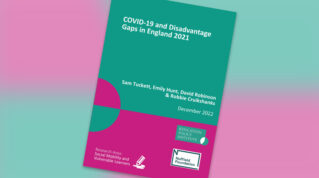“You joke about it with your friends – ‘we’re the year that didn’t do exams’ – but you do think you got the easy way out,” says Blackpool Sixth Form College student Megan Taylor, 18.
As the sun beams in through huge glass windows in a room on the college’s second floor, offering tree-topped views across the Fylde coast, Taylor is one of six students giving their views on the return of exams this summer – the first since pre-Covid 2019.
For Megan, the chance to take exams is about “self-credibility and self-fulfilment… You don’t have to worry about what other people think about you going through your young adult life and not having an exam”.
It’s a common theme. Earlier in the day we had visited South Shore Academy, also in Blackpool.
Students preferred to be taking exams. One said they were “more accurate”. Another didn’t want “Covid grades”.
‘The dynamic has changed’
But they were all nervous. A few talked about it being stressful. One of the reasons behind this, according to head Rebecca Warhurst, is that year 11 pupils have “not had the peers to look up to in the same way, due to lockdown.
“We noticed a change in ambience and dynamic but, with wellbeing at the heart of everything we do, we have been able to fully support our students.”
Ofqual allowed adaptations this year to try and smooth out some of the Covid disruption. One year 11 pupil at South Shore said being able to take in a formula sheet had “taken the stress off our shoulders”.
But the youngsters – we spoke to around 10 across years 11 and 10 – also said the extra adaptations just added more things to get used to. Some exams this year will have reduced content, and there have also been coursework changes.
The government confirmed this week that exams would return to full subject content coverage. While the intent is to return to normal “as quickly as possible”, it has not ruled out allowing exam aids and advance information in next year’s exams.
The year 10 pupils at South Shore think it only fair they should get some help. “We did miss a lot of school too,” one said. Another felt they had not properly settled into the independent learning of year 10 because of Covid disruption.
Speaking after the visits, Saxton said her heart was set on assisting pupils but, with her regulator hat on, the right thing to do is to check the evidence after the use of aids this year. The government will “monitor the path and impact of the pandemic” before deciding.
‘Classrooms are being taken out of action’
But back to this year, and schools and colleges are facing their own disruption amid a surge in students requesting access arrangements and reasonable adjustments to exams.
South Shore would usually have a handful of pupils asking to do their exams in a separate room. This year it is 20, most of whom say they are too anxious to sit in such a big room.
Four in five of the 527 heads surveyed by the Association of Schools and College Leaders said the level of stress and anxiety among exam students was higher than in pre-pandemic years. A similar number said they had received more requests from pupils to take exams in separate rooms.
A survey by training provider communicate-ed of 146 school and college staff found the average increase in referrals for extra exam help was around 30 per cent. The most popular requests were to sit the exam in a separate room, be given extra time, use a word processor or have supervised rest breaks.
But more than half of respondents said they felt their centre would not have the capacity to accommodate all the requests, as well as being overwhelmed by the time needed for the associated admin.
Stuart Ormson, assistant principal at Blackpool Sixth Form College, said students were “struggling to cope with anxiety and stress more generally. But that is becoming more and more challenging trying to house it. It’s taking classrooms out of action.”
In the meantime, the college is looking to repurpose a restaurant as an exams hall. Unity Academy in Blackpool is looking at using 22 rooms for 120 exam pupils.
Saxton pointed to the lack of familiarity with exams – for both pupils and new staff – as a contributory factor. She said schools were going “above and beyond in a new way” to provide such support. She hopes things will get closer to normality next year.
But the issues are also exacerbating invigilator recruitment struggles. Blackpool Sixth had already lost some of its most experienced invigilators, who don’t want to “take the risk” after Covid. The ASCL survey found more than a third of heads had not recruited enough invigilators.
Ofqual has relaxed some rules, including extending the normal ratio of one invigilator for every 30 pupils to 1:40. But staff we spoke to said they wanted to stick with 1:30 as having more adults in the room makes pupils feel more at ease. Blackpool Sixth has trained some of its senior leadership team as invigilators.
Challenges for new teachers, too
Like their pupils, many of the Blackpool schools’ early career teachers (ECTs) had not yet experienced exams.
Stephen Cooke, head of nearby Unity Academy, who joined us during the South Shore visit, said new teachers not knowing the exams process “puts a lot of pressure on the more experienced staff.
“So you have pressure at both ends. Although a lot of ECTs have been through it this year, so a lot of that worry will disappear quickly.”
This all follows an unrelenting few years for staff. South Shore had to defer an Ofsted inspection this year because 22 people were off.
They collapsed year groups into the hall, with classes taught by new teachers or non-specialists, just to keep the school open.
South Shore serves eight of the country’s 10 most deprived neighbourhoods. Sixty-two per cent of its pupils are on free school meals.
During Covid the school, like many of its neighbours, had to provide resources such as pens and paper to families. They also gave out dongles with 30GB of data as some parents did not have internet access, but live streaming lessons meant that was sometimes burnt through in a day.
Warhurst added: “We’ve all been through the same storm, but in very different boats.”
The school is making great progress with a literacy-centric approach that includes 40-minute form periods where teachers read books to pupils. The current year 10s, the first group to go through a programme where progress is tracked via the New Group Reading Test, run by GL Assessment, saw their average standardised age scores shoot up from 86.2 per cent in year 7 (well below average) to 94.6 per cent (average).
But, overall, the Blackpool heads felt the pandemic had exposed the inequalities between poorer pupils and their peers. Ofqual has admitted it was unable to come up with a solution that ironed out those differences.
However, with a “roll your sleeves up” attitude, staff have battled through to give students the best possible shot – and it means a lot to the youngsters.
Blackpool Sixth Form College student Lloyd Paterson, who hopes to study journalism at university, said exams offered him the chance to “prove I can do it. I didn’t have that fulfilment when we finished school”.
“I don’t want people looking back and seeing us as ‘the year that didn’t do GCSEs’,” added Taylor.

















Your thoughts